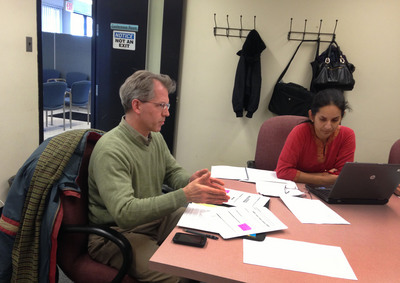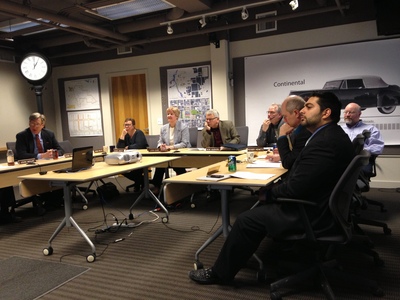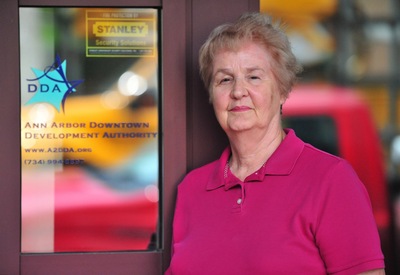
Downtown Ann Arbor's Main Street as it looked on a summer night last year. Ann Arbor Downtown Development Authority officials argue the success of the DDA is visible in the success of the downtown, which they consider the best in the state.
Ryan J. Stanton | AnnArbor.com
With private investments being made throughout downtown and new high-rise apartments popping up left and right, the amount of taxes being captured annually by the DDA is expected to grow by about $1 million over the next two years, according to new estimates.
At least two members of the Ann Arbor City Council want to see that growth curbed, and they're co-sponsoring ordinance changes on Monday night's council agenda that could result in the return of roughly $1 million a year in captured taxes from the DDA to various taxing units.

City Council Members Stephen Kunselman and Sumi Kailasapathy, shown here at a city audit committee meeting this past week, are co-sponsoring a set of ordinance changes that would place new limits on the Ann Arbor DDA.
Ryan J. Stanton | AnnArbor.com
"I don't think the DDA needs another $1 million on top of the $3.7 million they already have because the city has needs of its own," Kunselman said. "And so do the other taxing units."
The taxing units the DDA takes revenue from include the city of Ann Arbor, Ann Arbor Transportation Authority, Washtenaw County, Washtenaw Community College, and the Ann Arbor District Library.
Kunselman said the ordinance changes are worded in such a way that the DDA wouldn't see a reduction in revenue from current levels.
Other proposed changes limit who can serve on the DDA's governing board and for how long.
"My purpose of bringing these forth is not to vilify the DDA, but to try to improve the institution," Kunselman said at a recent meeting, quickly adding: "Because it's easy to vilify the DDA ...."
DDA board members were quick to jump on Kunselman's remarks at their last meeting. They took turns criticizing what's being proposed while speaking proudly of the DDA.
DDA board member Sandi Smith, a downtown resident and business owner, said Kunselman demonstrates a lack of understanding of how TIF funding works.
The revenue netted by the DDA within the bounds of the downtown district — unchanged since its creation by the city in 1982 — are what's known as "tax-increment financing" or TIF funds.
The fact that the DDA's revenue capture is growing means the downtown tax base is growing, Smith said, adding that means the DDA is doing its job.
"The investment we make in infrastructure, from the DDA's perspective, actually brings the whole downtown up and brings more money to the general fund. It brings more money to all of the taxing authorities, so an increase in value of downtown properties helps everybody," she said.
DDA Chairwoman Leah Gunn, who would be term-limited off the board under the proposal, said the DDA seems to be working well for everybody right now.
"They really ought not to mess with something that works well," she said. "We have been very good stewards of the city's infrastructure."
A tiff over TIF dollars
The DDA has used TIF revenue over the years to fund streetscape improvements, new LED streetlights throughout downtown, solar panels at the Farmers Market, repairs and upgrades to Liberty Plaza, Sculpture Plaza and the Kempf House museum, and many other projects.
Additionally, the DDA has spent millions of TIF dollars in the downtown on city infrastructure, including new water mains, public trash cans, alley repairs and miles of sidewalk repairs. The DDA also contributed $8.2 million to the city's new municipal center.

Former county administrator Bob Guenzel said he's observed a strong commitment to fiscal stability since he's been on the DDA board the last few years. "It's now proposed that we change the rules about that, about how we capture the TIF. Frankly, I hear no reason for that."
Ryan J. Stanton | AnnArbor.com
Additionally, it included $276,036 that would have gone to the Ann Arbor Transportation Authority, $772,229 that would have gone to Washtenaw County, $499,120 that would have gone to Washtenaw Community College, and $208,101 that would have gone to the Ann Arbor District Library.
To put that into context, the DDA captured about 17 percent of the $22 million in total taxes paid by downtown property owners last year.
No money is being diverted from K-12 public schools or Ann Arbor SPARK, which also levy taxes on downtown properties.
If the ordinance changes are enacted as proposed, the city's treasurer estimates the DDA would have to refund a total of $713,221 to the different taxing units in the 2013-14 fiscal year.
Kunselman said he's going to take it a step further and propose pushing the refund up to roughly $1 million for each of the next two years.
In the first year, that would return $613,919 to the city, $213,583 to the county, $134,757 to Washtenaw Community College and $57,421 to the library. About 12.5 percent of the city's share is a pass-through to AATA.
Even with those refunds, the DDA still would collect nearly $3.7 million in the next fiscal year, which starts July 1, and nearly $3.8 million in 2014-15, according to city estimates.
Kunselman and Kailasapathy both said the ordinance changes they're proposing aren't politically motivated and shouldn't be viewed as an attack on the DDA.
"That's the misconception I think that's floating around," Kailasapathy said. "I'm a CPA and we do auditing and we do compliance and taxes, so for me it's more of an issue of doing it right."
Given that the DDA is a component unit of the city, she said, the city owes it to other taxing units to make sure the TIF capture is handled fairly and no excess funds are kept by the DDA.
"If you see the TIF capture ... it's growing at a tremendous rate," she said. "We're just saying it might slow the growth a little bit."
DDA term limits?
Another proposed change would prohibit Mayor John Hieftje and any future mayor of Ann Arbor from serving on the DDA board after the November 2014 election.
As mayor, Hieftje is in charge of appointing all of the DDA's board members, and for several years has served on the board himself.

The Ann Arbor DDA board at its most recent meeting.
Ryan J. Stanton | AnnArbor.com
Additionally, no other elected public officials of any kind could serve on the DDA board under the proposal.
"I think that's the kind of thing we need to remove to instill trust and confidence into the institution, so that's the purpose of that," Kunselman said. "It's not to target any particular elected official."
Term limits also would be placed on DDA board members, so no one could serve more than two consecutive four-year terms, or eight years total.
"The term limit is important because we have one member who has been serving for over 20 years, and I think that kind of indicates the DDA is getting maybe a little set in their ways and isn't open to change," Kunselman said. "They're unwilling to look at new ideas."
DDA board member Keith Orr, a downtown business owner for more than 20 years and a resident of Ann Arbor since 1976, said he's proud of the work the DDA does.
"We're doing something which very few other government entities are doing: focusing on infrastructure," he said. "We hear the news about our crumbling infrastructure across the nation, but very few entities are doing anything about it."
Part of the reason the DDA works so well, Orr said, is because it's not an elected body where its members are preoccupied with getting re-elected.
"This is the reason the DDA is a de facto parking authority," he said. "City Council abdicated their responsibility to maintain the parking system they owned and operated many years ago. They still own the parking system, but now it is maintained and run in a manner the envy of most cities."
Former county administrator Bob Guenzel said he's observed a strong commitment to fiscal stability since he's been on the DDA board the last few years.

"We're on the cusp of redevelopment in the downtown for businesses, and we also hope for residences," said DDA Chairwoman Leah Gunn, the longest-serving member of the board. "We have a number of new apartment buildings that are in progress and some that are planned. So my feeling is the DDA has been careful, it has been prudent."
Ryan J. Stanton | AnnArbor.com
Guenzel and other board members said the DDA's success is visible in the success of the downtown, and in a well-maintained parking system.
"I think it's the best downtown in the state of Michigan, and I think the DDA deserves a lot of credit for that, and I wouldn't mess with it," he said.
"We're on the cusp of redevelopment in the downtown for businesses, and we also hope for residences," Gunn added. "We have a number of new apartment buildings that are in progress and some that are planned. So my feeling is the DDA has been careful, it has been prudent."
DDA board member Russ Collins, executive director of the Michigan Theater, said the people serving on the DDA board are all community volunteers with a vested interest in the downtown.
"Is everything perfect? I don't think so," he said. "I get mad at parking meters. I get mad at ice and snow being where you might not want it to be.
"But in terms of good use of taxpayer dollars by volunteers who are committed to the city, who work and live in the downtown and who care, that's what you have on this board," he said. "And to have it be a political punching bag for the sake of political aspiration doesn't seem to be good use of the volunteers who are here out of their bottom-line concern for a place that they love."
'Us versus them'
Kunselman and Kailasapathy continued to air their concerns about the DDA at a meeting of the City Council's audit committee this past week.
Kunselman raised concerns that the DDA's latest audit from the last fiscal year shows more than $4 million was transferred from the TIF fund to the DDA's parking fund. That's because the DDA is using TIF revenue to help finance the new underground parking garage built on Fifth Avenue.
Kunselman said it just seems odd that TIF dollars are being used to subsidize the parking fund at the same time the city's general fund is getting 17 percent of the DDA's parking revenues.
The DDA's audit shows the TIF fund balance dropped by nearly $1.4 million last year — from more than $6.1 million to just under $4.8 million. However, the parking fund, which was on the verge of deficit at one point, rebuilt a $2.1 million fund balance.
The DDA's overall cash reserves went up from $8.2 million to $8.6 million. Parking revenues totaled about $17.1 million, and overall revenues totaled about $21.1 million — $20.6 million of which was spent last year, the audit shows.
Council Member Sally Hart Petersen, another member of the audit committee, suggested there's been too much "us versus them" in the dialogue about the DDA.
"I think it's a good reminder that 'them' is us," she said, pointing out that the DDA is a component of the city government and the city owns the DDA's assets.
But Kunselman argued it's an important distinction that the DDA receives tax revenues from other taxing units aside from the city.
He also thinks the DDA, a four-employee operation, has gotten a free pass while other departments have had to cut their budgets.
"The DDA is the only agency, so to speak, within the city that has been increasing its budget since 2002 as we've been decreasing our budget, cutting FTEs, cutting services," he said.
Ryan J. Stanton covers government and politics for AnnArbor.com. Reach him at ryanstanton@annarbor.com or 734-623-2529. You also can follow him on Twitter or subscribe to AnnArbor.com's email newsletters.